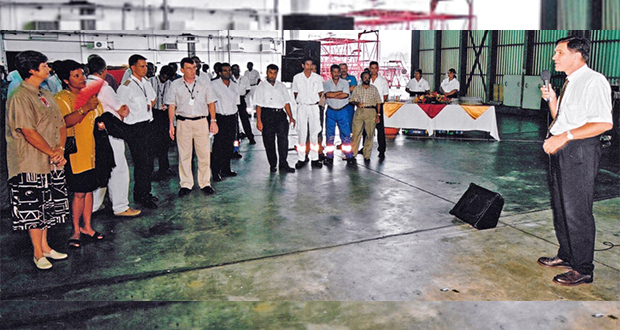Publicité
An urgent need to care for the elderlies
Par
Partager cet article
An urgent need to care for the elderlies

“Cry, the Beloved Country” or “Stop that exodus”. The first is a novel by South African Alan Paton (1948), the second is anonymous. Our country is in the throes of a serious disaster – a rapidly ageing population without the institutional arrangements and policies to cope with ageing. Our Prime Minister (PM) in every public address includes a couple of very strong sentences on his concern for the aged and his determination to ensure that the ageing process happens peacefully and that our seniors deserve our gratitude and respect. He adds that, unlike other politicians, he “walks the talk” and does not indulge in vacuity and empty promises.
Goodies or real benefits?
The government, thanks to the determination of the PM, has, since coming into office, done a lot by way of enhanced social security benefits for the elderly. But one caveat is that “Goodies” instead of benefiting the elderly, may be going to unintended beneficiaries. From what we often hear, many elderly persons are tortured by their children or grandchildren who wrest from them the major part of their hard-earned pensions. “Hard-earned” because they have worked hard and for long hours either in the open with a sickle, a hammer or a spade or in a cubicle for long hours racking their brains over vexed problems. When he refers to them, the PM waxes so eloquent that audiences get carried by his emotional appeal. Enhancing social security is not bad in itself but it should be supplemented by a train of policy decisions and measures which would allow the aged to benefit from them personally without being exploited by close ones whose pecuniary needs have been inflated by unhealthy habits.
Policies that would substantially benefit the elderly
Personal experience teaches us a lot about how to improve the physical environment of the elderly. The roads and pavements in busy towns should get the special attention of the government and the local authorities if people are to tread them safely. In some places, the pavements are so bad that old people have to walk squarely on the roads with the danger from vehicular traffic. Vehicles such as buses and taxi cars have fortunately improved the security of passengers but bus drivers should learn to rely on their conductors before moving their vehicles. That old lady had spent a lifetime working for a local authority. Now that she has retired, she likes to move about, window shopping or visiting sick people and relatives for free. Who can blame her? The other day, the bus in which she had been travelling, through palpable negligence, moved and did not allow her to alight properly. Her leg was crushed and later amputated. Those who sell those artificial legs took her for a ride and she has put it aside and is now asking friends to help financially to obtain a replacement. Surely we need laws to deal with reckless bus drivers and others involved in shady businesses? And why not do like in French-inspired legal jurisdictions, combine criminal and civil actions in similar cases.
The scandalous sloth of the pre-judicial proceedings
Police enquiries take a hell of a time and victims never know whether they may and where they can ask about the progress of the investigation. When the matter reaches the court, old people are at the end of their tether. Attorneys and barristers are expensive; they are often so busy that cases become protracted and when the judgment is delivered, the victim is often in his tomb. So, a civil case is well-nigh impossible. The PM could ask the relevant ministers to familiarize themselves with the revolution which was effected in the civil justice process in the UK through some important pieces of legislation-the Civil Procedure Act 1997 and the Civil Procedure Rules 1998, (effective from April 1999). These new policies encourage, whenever possible, out of court settlement, exchange of documents and speedy trials or hearings. Arbitration is also possible in the lower courts. Such a system would work wonders in Mauritius. It would have the advantage of breaking the senior barristers’ monopoly of important cases; bring down their case loads for the benefits of new barristers. Elderly people as well as others, in particular, the vulnerable groups, would stand to gain as fees, once fixed, cannot be increased at the whims and caprices of Counsel.
Other areas where the interests of elderly people can be safeguarded
Another area where policies for the protection of the elderly could be strengthened is noise pollution. A neighbour buys a powerful music player with many loudspeakers and allows it to play until late at night or some young people hire a bungalow for a week nearby and sing like mad men until they become hoarse. The law should be able to deal with such disorderly habits. The youths have a right to enjoy themselves but the elderly have an equal right to their quiet (…). Do we have law enforcement in Mauritius? The authorities should wake up from their lethargy and take their roles seriously. When we are paid to do a job we should not always wait for reports to be filed in before acting. Otherwise, we are not delivering and should be taken to task whatever our hierarchical position. Our elderly people should be convinced that the PM really walks the talk otherwise, they will continue grumbling and repeating ad nauseam “zot tou parey, nek zis kan éleksion ki ou trouv zot” (…). (…) Our PM, if I may be allowed to give him a piece of advice, should beware of those who never tell him the truth. Every week on Radio Plus he will realise that many people are discontented and are not afraid to express themselves openly. They are unlike the women who strewed flowers in the path of our former PM and kissed him plenty (…). Thousands of hypocrites who brought down Sir Anerood and later Navin Ramgoolam. My advice is do small things to bring some comfort everywhere. Prestige project doers, like the sonneteers of the Elizabethan era, who wrote to achieve immortality, will not fetch votes but unfair criticisms whereas walking the talk with regard to the elderly will bring a generous bank vote (…). And budget time is an occasion for some hard thinking. A turnaround is always possible (…).
Publicité
Les plus récents






